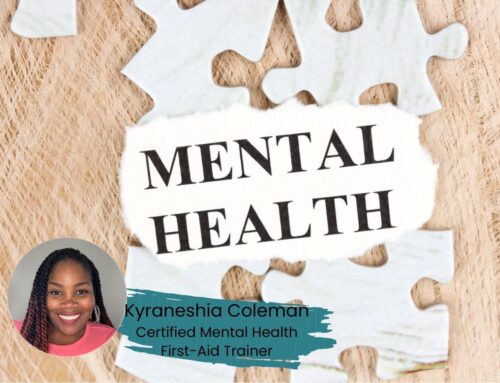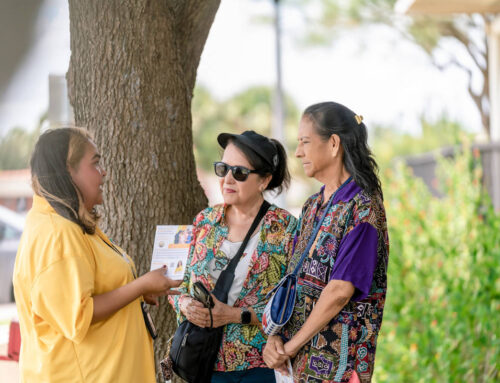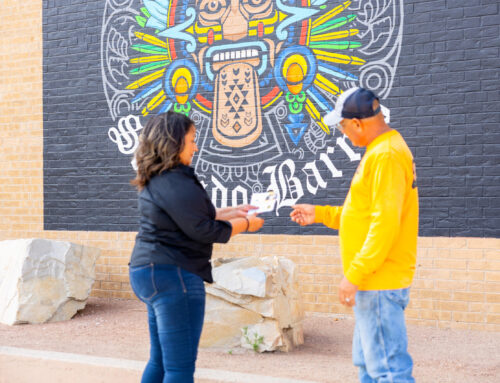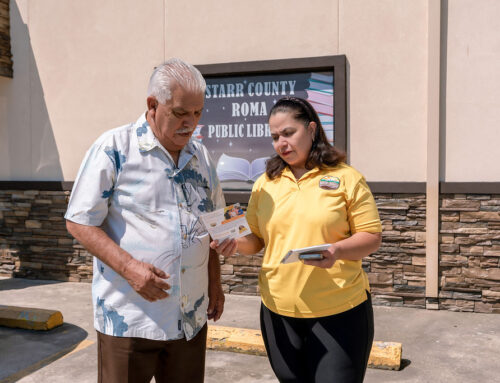Three Ways COVID-19 has Affected Hispanic and Latino Caregivers of Older Adults
Published January 2022 | Read this article in Spanish | Back to all news and updates.
We have learned a lot about how the effects of the virus have disproportionately affected some groups. We know that Hispanic/Latinos were hit particularly hard because of an increase in exposure, vulnerability to severe complications of the virus, and an initial hesitancy in getting the vaccine.1,2 We also know that restrictions on daily life have also put a strain on caregivers within the Hispanic/Latino community.
Last fall, we talked with two of our MHP Salud staff about their experiences as Latina caregivers. Although we have heard stories about what it has been like caring for an older adult loved one throughout this pandemic, there is still a lot that we don’t know about how this pandemic has affected Hispanic/Latino caregivers of older adults. MHP Salud shared a short online survey with Hispanic/Latino caregivers to learn about their experiences and needs throughout the pandemic. We found that the pandemic has affected caregivers’ mental health and how they provide care for their older adult loved ones. Caregivers also shared what resources would have been helpful.
As we are entering into the third year of the COVID-19 pandemic, we can learn from these responses and focus on supporting caregivers in a culturally appropriate way as we move forward. Below we describe 3 ways that COVID-19 has affected Hispanic/Latino caregivers of older adults.
COVID-19 has had an effect on Hispanic/Latino Caregiver mental health.
85% of caregiver survey respondents said that the COVID-19 pandemic has affected their mental health in some way.
With each wave of the pandemic, more and more Hispanic/Latino individuals have gotten sick and know someone who has gotten sick or severely ill or died. Approximately 1/3 of survey respondents indicated they know someone who has gotten severely ill or who has passed away from COVID-19. Experiencing first-hand these negative effects of COVID-19 on their community has generated fear among caregivers.
- 63% of respondents said they were afraid of exposing their older adult loved ones to the virus.
- 56% of respondents were afraid of getting COVID-19 themselves.
Our way of life has changed dramatically. Social isolation and social distancing measures have changed how we live our daily lives. As one respondent shared, “It has affected my physical health. I have a lot of stress and feel very impatient.”
- 52% of survey respondents indicated that they felt more stressed as a result of COVID-19.
- 30% indicated they were feeling socially isolated from their support system, friends, and/or family.
Hispanic/Latinos are more likely to live in intergenerational households with grandchildren, parents, and grandparents. For caregivers “sandwiched” between caring for smaller children and their older adult parents, the pandemic has been extra challenging. One respondent described their experience:
“Caring for both my children and caring for my older adult parents was difficult. [The] lives and routine of both kids and parents were disrupted causing a lot of stress and more demand of my time to help with coordination of health care, being present and relaxed to engage without having to worry about my own job situation and work demands.”
COVID-19 has changed the way some care for their loved one(s).
Most survey respondents (85%) indicated that COVID-19 affected how they care for their older adult loved ones.
Some of the most common ways it affected how they provide care include:
- Caregiving responsibilities have become more demanding due to COVID-19. (59%)
- Difficulty managing caretaking responsibilities and other responsibilities such as work, family, home, etc. (52%)
- Unable to attend appointments with older adult loved ones due to COVID-19 restrictions. (44%)
- Not being able to get support from friends and family during the pandemic. (41%)
- Not being able to provide the level of care that they would have liked. (26%)
Many older Hispanic/Latino adults prefer to remain in their homes or that of a family member as they age. In some situations, their caregivers are unable to provide full-time care for them, and, therefore, their older adult loved one must move into a nursing home, which can be very expensive.
One respondent shares their story,
“Because the nursing home[s] are so expensive in the area where my dad was [living] my bother [made] the decision to move my dad to my country. Before the pandemic I was able to visit my dad at least 1 to 2 times a year, because [of] the pandemic I was not able to visit my dad, my few relatives that I have in my dad’s country, were not able to visit him.”
At the beginning of the COVID-19 pandemic, we saw nursing home residents disproportionally affected by the virus as well as the restrictions placed. As a result, social distancing measures were strictly enforced to keep residents physically safe. Unfortunately, those same restrictions were causing severe social isolation in older adults.
Hispanic/Latino caregivers feared for the safety of their older adult loved ones and some made the decision to bring that person into their home if they were able. This was also seen among Hispanic/Latino families. As a respondent shared,
“My mom was in a nursing home when the pandemic began and it was for that reason I brought her to live with us.”
Resources can help alleviate the burden for some Hispanic/Latino Caregivers
Culturally appropriate resources and supports can help caregivers improve their mental and physical health as well as their quality of life! Caregiver respondents to our survey shared that the following resources would be helpful for them:
- Newsletters with tips and resources
- Information about what is the normal aging process and what to be concerned about or watch out for
- Resources for those “sandwiched” by for caring for older adults and small children
- Respite services and in-home care for those who are working
- Help with household responsibilities
- Virtual support group for caregivers
- Webinars and virtual learning opportunities
- Have social workers or other staff to help connect with loved ones in nursing homes to reduce social isolation and improve mental health in residents
- More accessible and reliable internet services in older adults’ home to help with daily activities such as paying bills and buying groceries.
The COVID-19 pandemic has put a strain on Hispanic/Latino caregivers’ mental health and ability to provide care. Fortunately, there are some things that can be done to help alleviate some of this burden. Community Health Workers (CHWs) are trusted members of the community that connect their peers to health and social resources. As such, CHWs are uniquely qualified to deliver some of these resources to our caregivers in a culturally appropriate manner. Visit our website for more information about CHWs and how to start your own program! Check out our COVID-19 Resource Directory with resources for caregivers of older adults!
This project was supported by the Administration for Community Living (ACL), U.S. Department of Health and Human Services (HHS) as part of a financial assistance award totaling $255,124.00 with 75 percentage funded by ACL/HHS and $85,949.42 amount and 25 percentage funded by non-governmental source(s). The contents are those of the author(s) and do not necessarily represent the official views of, nor are an endorsement, by ACL/HHS, or the U.S. Government.
Blog Topics
This resource was developed by MHP Salud with essential guidance and understanding about ADRD provided by Alzheimer’s Association – San Antonio and South Texas Chapter.

In this directory, you can access educational resources focused on Community Health Worker (CHW) COVID-19 interventions for Latinos and Farmworker Communities. You can also find resources for family caregivers of Latino Older Adults.








